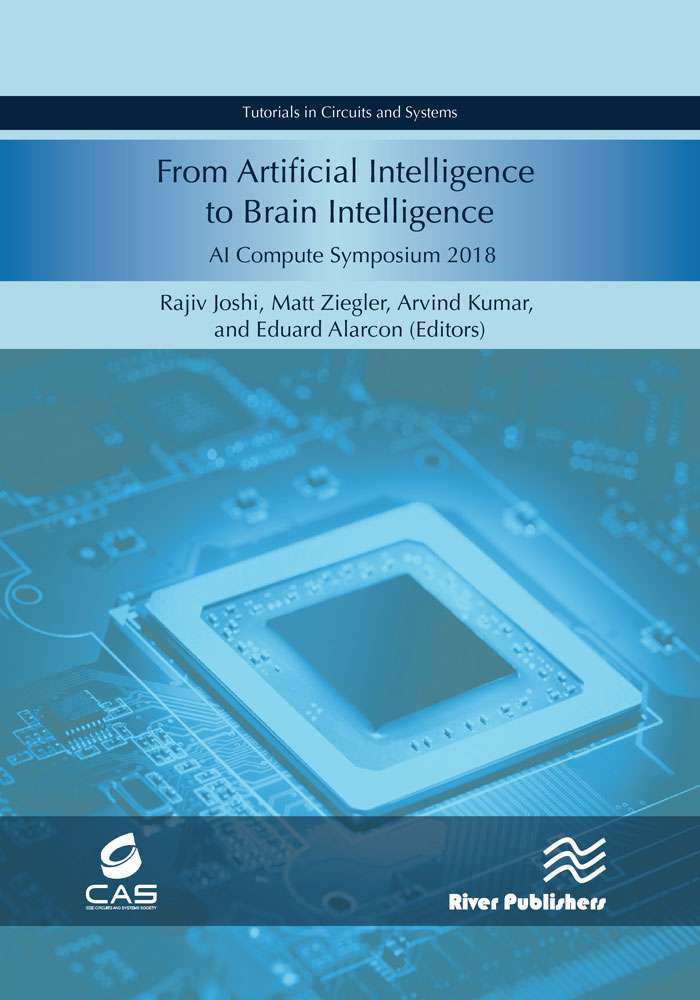River Publishers Series in Electronic Materials, Circuits and Devices
From Artificial Intelligence to Brain Intelligence
Editors:
Rajiv Joshi, IBM Research Division, USA
Matthew Ziegler, IBM Research Division, USA
Arvind Kumar, IBM Research Division, USA
Eduard Alarcon, Technical University of Catalunya, UPC BarcelonaTech, Spain
ISBN: 9788770221238 e-ISBN: 9788770221245
Available: February 2020
The field of AI is not new to researchers, as its foundations were established in the 1950s. After many decades of inattention, there has been a dramatic resurgence of interest in AI, fueled by a confluence of several factors. The benefits of decades of Dennard scaling and Moore's law miniaturization, coupled with the rise of highly distributed processing, have led to massively parallel systems well suited for handling big data. The widespread availability of big data, necessary for training AI algorithms, is another important factor. Finally, the greatly increased compute power and memory bandwidths have enabled deeper networks and new algorithms capable of accuracy rivaling that of human perception.
Already AI has shown success in many diverse areas, including finance (portfolio management, investment strategies), marketing, health care, transportation, gaming, defense, robotics, computer vision, education, search engines, online assistants, image/facial recognition, anomaly detection, spam filtering, online customer service, biometric sensors, and predictive maintenance, to name a few. Despite these remarkable advances, the human brain is still superior in many ways - including, notably, energy efficiency and one-shot learning - giving researchers new areas to explore. In summary, AI research and applications will continue with vigor in software, algorithms, and hardware accelerators. These exciting developments have also brought new questions of ethics and privacy, areas which must be studied in tandem with technological advances.
To continue the success story of AI, the AI Compute symposium was launched with the sponsorship of IBM, IEEE CAS and EDS for the first time. The aim of this publication is to compile all the materials presented by the renowned speakers in the symposium into a book format, serving as a learning tool for the audience.
This book contains two broad topics: general AI advances (chapters 1-5) and neuromorphic computing directions (chapters 6-9). Technical topics discussed in the book include:
Already AI has shown success in many diverse areas, including finance (portfolio management, investment strategies), marketing, health care, transportation, gaming, defense, robotics, computer vision, education, search engines, online assistants, image/facial recognition, anomaly detection, spam filtering, online customer service, biometric sensors, and predictive maintenance, to name a few. Despite these remarkable advances, the human brain is still superior in many ways - including, notably, energy efficiency and one-shot learning - giving researchers new areas to explore. In summary, AI research and applications will continue with vigor in software, algorithms, and hardware accelerators. These exciting developments have also brought new questions of ethics and privacy, areas which must be studied in tandem with technological advances.
To continue the success story of AI, the AI Compute symposium was launched with the sponsorship of IBM, IEEE CAS and EDS for the first time. The aim of this publication is to compile all the materials presented by the renowned speakers in the symposium into a book format, serving as a learning tool for the audience.
This book contains two broad topics: general AI advances (chapters 1-5) and neuromorphic computing directions (chapters 6-9). Technical topics discussed in the book include:
- Research Directions in AI algorithms and systems
- An ARM perspective on hardware requirements and challenges for AI
- The new Era of AI hardware
- AI and the Opportunity for Unconventional Computing Platforms
- Thermodynamic Computing
- Brain-like cognitive engineering system
- BRAINWAY and Nano - Abacus architecture: Brain-inspired Cognitive Computing using Energy Efficient Physical Computational Structures, Algorithms and Architecture Co-Design
- Applying Lessons from Nature for Today's Computing Challenges
- Emerging Memories - RRAM Fabric for Neuromorphic Computing Applications
AI algorithms and systems, memory processing unit, In-memory computation, Thermodynamic computing, Neuromorphic, Cognitive computing, architectures, brain chips, RRAM Memory
